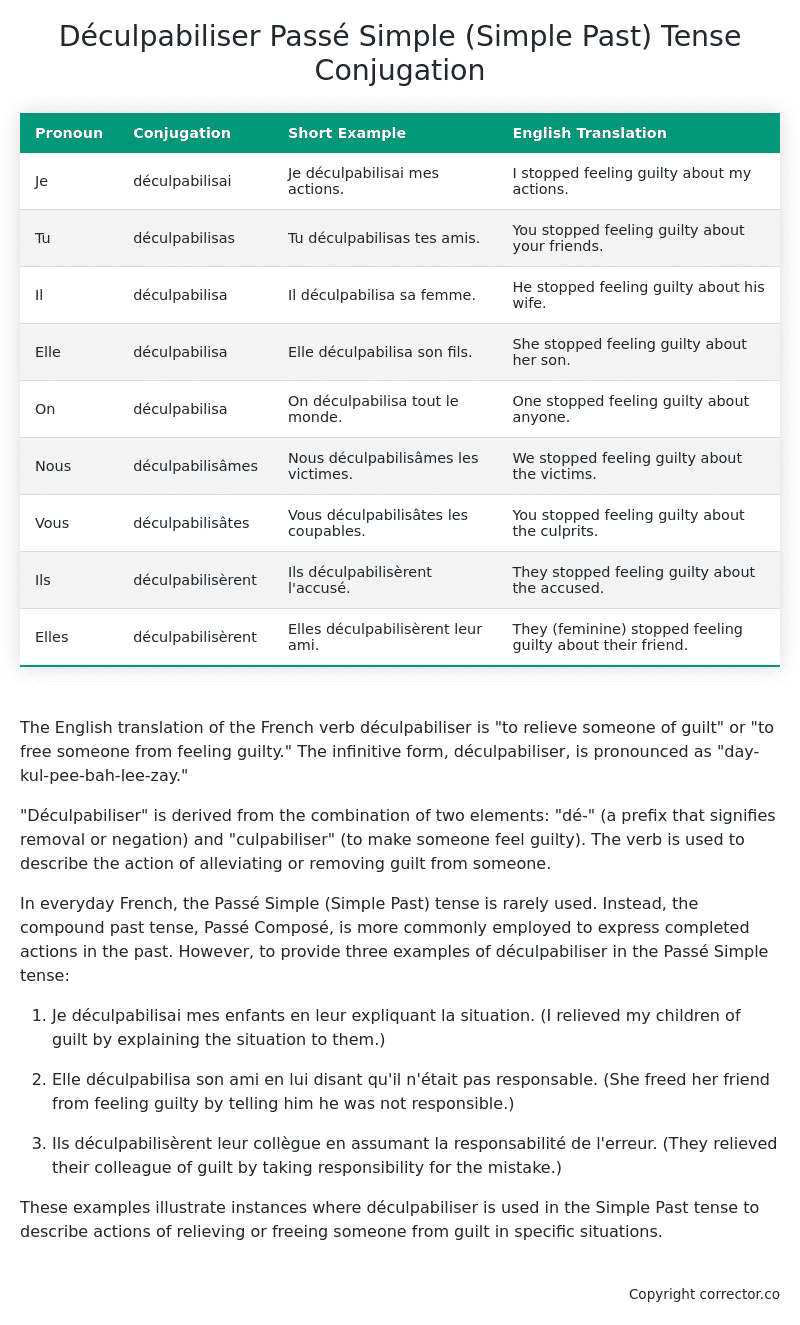Passé Simple (Simple Past) Tense Conjugation of the French Verb déculpabiliser
Introduction to the verb déculpabiliser
The English translation of the French verb déculpabiliser is “to relieve someone of guilt” or “to free someone from feeling guilty.” The infinitive form, déculpabiliser, is pronounced as “day-kul-pee-bah-lee-zay.”
“Déculpabiliser” is derived from the combination of two elements: “dé-” (a prefix that signifies removal or negation) and “culpabiliser” (to make someone feel guilty). The verb is used to describe the action of alleviating or removing guilt from someone.
In everyday French, the Passé Simple (Simple Past) tense is rarely used. Instead, the compound past tense, Passé Composé, is more commonly employed to express completed actions in the past. However, to provide three examples of déculpabiliser in the Passé Simple tense:
-
Je déculpabilisai mes enfants en leur expliquant la situation.
(I relieved my children of guilt by explaining the situation to them.) -
Elle déculpabilisa son ami en lui disant qu’il n’était pas responsable.
(She freed her friend from feeling guilty by telling him he was not responsible.) -
Ils déculpabilisèrent leur collègue en assumant la responsabilité de l’erreur.
(They relieved their colleague of guilt by taking responsibility for the mistake.)
These examples illustrate instances where déculpabiliser is used in the Simple Past tense to describe actions of relieving or freeing someone from guilt in specific situations.
Table of the Passé Simple (Simple Past) Tense Conjugation of déculpabiliser
| Pronoun | Conjugation | Short Example | English Translation |
|---|---|---|---|
| Je | déculpabilisai | Je déculpabilisai mes actions. | I stopped feeling guilty about my actions. |
| Tu | déculpabilisas | Tu déculpabilisas tes amis. | You stopped feeling guilty about your friends. |
| Il | déculpabilisa | Il déculpabilisa sa femme. | He stopped feeling guilty about his wife. |
| Elle | déculpabilisa | Elle déculpabilisa son fils. | She stopped feeling guilty about her son. |
| On | déculpabilisa | On déculpabilisa tout le monde. | One stopped feeling guilty about anyone. |
| Nous | déculpabilisâmes | Nous déculpabilisâmes les victimes. | We stopped feeling guilty about the victims. |
| Vous | déculpabilisâtes | Vous déculpabilisâtes les coupables. | You stopped feeling guilty about the culprits. |
| Ils | déculpabilisèrent | Ils déculpabilisèrent l’accusé. | They stopped feeling guilty about the accused. |
| Elles | déculpabilisèrent | Elles déculpabilisèrent leur ami. | They (feminine) stopped feeling guilty about their friend. |
Other Conjugations for Déculpabiliser.
Le Present (Present Tense) Conjugation of the French Verb déculpabiliser
Imparfait (Imperfect) Tense Conjugation of the French Verb déculpabiliser
Passé Simple (Simple Past) Tense Conjugation of the French Verb déculpabiliser (You’re reading it right now!)
Passé Composé (Present Perfect) Tense Conjugation of the French Verb déculpabiliser
Futur Simple (Simple Future) Tense Conjugation of the French Verb déculpabiliser
Futur Proche (Near Future) Tense Conjugation of the French Verb déculpabiliser
Plus-que-parfait (Pluperfect) Tense Conjugation of the French Verb déculpabiliser
Passé Antérieur (Past Anterior) Tense Conjugation of the French Verb déculpabiliser
Futur Antérieur (Future Anterior) Tense Conjugation of the French Verb déculpabiliser
Subjonctif Présent (Subjunctive Present) Tense Conjugation of the French Verb déculpabiliser
Subjonctif Passé (Subjunctive Past) Tense Conjugation of the French Verb déculpabiliser
Subjonctif Imparfait (Subjunctive Imperfect) Tense Conjugation of the French Verb déculpabiliser
Conditionnel Présent (Conditional Present) Tense Conjugation of the French Verb déculpabiliser
Conditionnel Passé (Conditional Past) Tense Conjugation of the French Verb déculpabiliser
Conditionnel Passé II (Conditional Past II) Tense Conjugation of the French Verb déculpabiliser
L’impératif Présent (Imperative Present) Tense Conjugation of the French Verb déculpabiliser
L’impératif Passé (Imperative Past) Tense Conjugation of the French Verb déculpabiliser
L’infinitif Présent (Infinitive Present) Tense Conjugation of the French Verb déculpabiliser
L’infinitif Passé (Infinitive Past) Tense Conjugation of the French Verb déculpabiliser
Le Participe Présent (Present Participle) Tense Conjugation of the French Verb déculpabiliser
Le Participe Passé (Past Participle) Tense Conjugation of the French Verb déculpabiliser
Struggling with French verbs or the language in general? Why not use our free French Grammar Checker – no registration required!
Get a FREE Download Study Sheet of this Conjugation 🔥
Simply right click the image below, click “save image” and get your free reference for the déculpabiliser Passé Simple tense conjugation!

Déculpabiliser – About the French Passé Simple (Simple Past) Tense
Formation
Usage
Narration
Historical Context
Interactions with other tenses
Passé Composé
Imparfait
Conditional and Subjunctive
Summary
I hope you enjoyed this article on the verb déculpabiliser. Still in a learning mood? Check out another TOTALLY random French verb conjugation!


